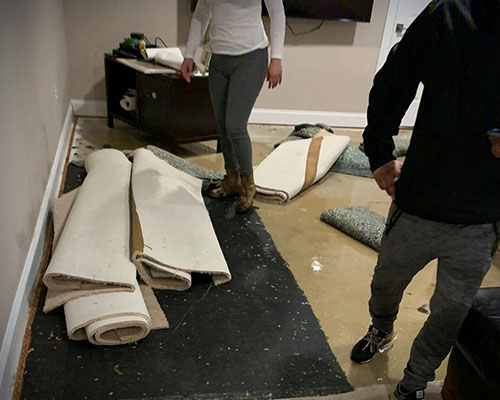- Intro
- How To Understand Water Damage In Apartments
- What Does The Landlord Have To Do?
- What The Tenant Needs To Do?
- Coverage For Insurance
- Process Of Mitigation And Restoration
- Legal Recourse For Tenants
- Keeping Records Of And Reporting Water Damage
- Preventative Steps
- What Happens When You Ignore Water Damage
- Act Now To Combat Water Damage In Apartments!
Water Damage In Apartments: Who's Responsible For Fixing It?
Apartment water damage can be a nightmare for both owners and renters. From broken pipes to roofs that leak, water getting in can do a lot of damage to buildings, put people's health at risk, and cost a lot of money if it's not fixed quickly and correctly. What about repairing water damage in rental homes, though? Who is responsible? We should look into this complicated problem and make it clear what landlords and tenants should do and how they should do it.
How to Understand Water Damage in Apartments
If water gets into a room and does damage, that damage is called water damage. It can be caused by many things, like plumbing problems, natural disasters, or not doing enough upkeep. Water damage often shows up as rotting wood, mold growth, peeling paint, and floors that are twisted. It's important to take care of water damage right away to stop it from getting worse and to lower the health risks that come with mold and mildew.
What does the landlord have to do?
Landlords are required by law to keep their rental properties in a state where people can live there. This includes fixing water damage right away. They are in charge of making sure that the plumbing, roof, and other building parts are all in good shape. Some of these systems are responsible for landlords fixing water damage that happens when they don't work right.
Landlords should not only fix the damage but also take steps to make sure it doesn't happen again. This could mean doing regular maintenance checks and fixing any problems as soon as they come up.
What the tenant needs to do?
While owners are usually the ones who fix water damage caused by problems with the building's structure, tenants can also help stop and repair water damage. Tenants must tell the owner or property manager right away about any signs of water damage. This includes leaks, spots, or smells that don't seem right and could mean there is a problem.
Tenants should also take care to avoid water damage by keeping tools like washing machines and dishwashers in good shape and fixing any plumbing problems, like clogged drains, as soon as possible.
Coverage for insurance
Apartment water damage insurance can vary between landlords and tenants based on the type of policy they each have. Often, landlords have insurance that covers the building's construction and repairs for water damage caused by storms or burst pipes.
People who rent should get renter's insurance so that their items are covered in case of water damage or other disasters. Some renter's insurance plans cover liability as well, which can help protect renters from being sued if they are blamed for water damage to the property.
Process of Mitigation and Restoration
If you have water damage, you need to move quickly to limit the damage and stop other problems from happening, like mold growth. Usually, the following steps make up the process of reduction and restoration:
- Assessment: A full inspection is done to determine the extent of the water damage and where it comes from.
- Extraction: Specialized tools, like pumps and vacuums, are used to get rid of standing water.
- Drying: Powerful fans and dehumidifiers are used to dry out the damaged areas.
- Cleanup: The surfaces that get dirty are washed and sanitized to stop mold and germs from growing.
- Repairs: Things like drywall, flooring, and insulation that are damaged are fixed or changed as needed.
Legal Recourse for Tenants
If landlords don't fix water damage right away or don't make the necessary repairs, renters may be able to take action in court. Depending on where they live, renters may be able to refuse to pay rent, fix the damage themselves, take the cost out of their rent, or even end the lease.
Tenants should know their rights and responsibilities under local landlord-tenant rules and keep track of all conversations they have with their landlord about the water damage.
Keeping records of and reporting water damage
Both the owner and the tenant should carefully record any water damage. This means saving pictures or videos of the damage, copies of any messages you send to the other party, and receipts for any work done to fix or lessen the damage. It is important to report water damage right away so that repairs can be made fast and everyone's interests are protected.
Preventative Steps
Water damage in houses can be avoided by being careful not to let it happen. Tenants should have regular maintenance checks done by their landlords to find and fix possible problems before they get worse. This could mean checking the roof for damage, the pipes for leaks, and the drainage systems to make sure they are all working right.
Tenants can also prevent water damage by following good maintenance practices, such as regularly cleaning gutters and drains and quickly reporting any leaks or plumbing problems to the landlord.
What Happens When You Ignore Water Damage
Water damage that isn't fixed can be very bad for both landlords and renters. Water damage can make the building less safe to live in and can also cause health problems like mold and mildew to grow. If you don't fix water damage, it can lead to expensive repairs and a drop in the value of your home.
Landlords and tenants can reduce the risks of water damage and protect their investment in the property by taking care of it quickly and effectively.
Act Now to Combat Water Damage in Apartments!
Water damage in apartments is a big problem that needs to be fixed quickly and with the help of both owners and tenants. Although owners are usually responsible for fixing damage caused by problems with the building's structure, tenants can also help stop and fix water damage. As long as both parties know their rights and duties, they can work together to protect the rental property from water damage and keep it in good shape.
Call Flood Damage Pro right away if you have water damage in your apartment. They can help you fix it up professionally. Our skilled staff is here to help you quickly and effectively get your property back to the way it was before the damage. Let us help you get back on track by setting up a meeting with us right away.

- Intro
- How To Understand Water Damage In Apartments
- What Does The Landlord Have To Do?
- What The Tenant Needs To Do?
- Coverage For Insurance
- Process Of Mitigation And Restoration
- Legal Recourse For Tenants
- Keeping Records Of And Reporting Water Damage
- Preventative Steps
- What Happens When You Ignore Water Damage
- Act Now To Combat Water Damage In Apartments!
Call now for an on-site evaluation and inspection for emergency services


On every job
CALL FLOOD DAMAGE PRO
